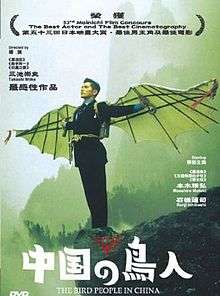The Bird People in China
| The Bird People in China | |
|---|---|
 The Bird People in China DVD cover | |
| Directed by | Takashi Miike |
| Produced by |
Yasuhiko Furusato Toshiaki Nakazawa |
| Written by |
Novel: Makoto Shiina Screenplay: Masa Nakamura |
| Starring |
Masahiro Motoki Renji Ishibashi Mako |
| Music by | Koji Endo |
| Cinematography | Hideo Yamamoto |
| Edited by | Yasushi Shimamura |
Release dates | June 10, 1998 |
Running time | 118 minutes |
| Country | Japan |
| Language | Japanese |
The Bird People in China (中国の鳥人 Chūgoku no chōjin) is a 1998 Japanese movie directed by Takashi Miike from a screenplay by his frequent collaborator Masa Nakamura. The film is considerably more mellow in tone compared to some of the director's more famous works.
Overview
The story tells of a Japanese businessman, who is sent to assess jade in a remote Chinese village, and a member of the yakuza, who is accompanying him to make sure his organization gets its proper share. The scenery of China is something not usually explored in Japanese film and thus was a massive change of pace for Miike, and a far cry from the recurrent themes of violence and sexuality present in his other films. Chinese locations in the movie include Dali City, Yunnan, where the characters enter through a stone arched gate and the Nujiang River, where they see people riding pulleys on steel cables over the water.
Cast
| Actor | Role |
|---|---|
| Masahiro Motoki | Wada (the businessman) |
| Renji Ishibashi | Ujiie (the yakuza) |
| Mako | Shen (the guide) |
| Li Li Wang | Yan, Si-chang |
| Michiko Kase | |
| Yuichi Minato | |
| Tomohiko Okuda | |
| Manzo Shinra |
Themes
The film explores themes of ecology and third world versus first world, depicting the East as a legendary place having a mystical knowledge not shared by the West (including Japan), but deepens its message by inserting the character Grandfather, a former British pilot. Near the end, the yakuza decides to kill all foreigners in order to keep the village away from civilization, but is reminded that in order to get to the village he had to use trains and airplanes.
The movie's message is a mixed one, showing the good and the bad both of technology and tradition. The film shares the same humanistic message and feel found in most of Miike's works.
Awards
The film was screened at a number of festivals before being released in theatrical distribution. It won the Audience Award at the 1998 Hawaii International Film Festival.